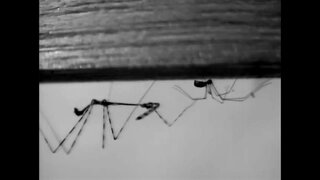Create a free profile to get unlimited access to exclusive videos, sweepstakes, and more!
Man Claims Peruvian Wolf Spider Laid Eggs Inside His Toe
Nightmare!
The itsy bitsy spider climbed up the waterspout. Down came the rain and washed the spider out. Out came the Sun and dried up all the rain. And the itsy bitsy spider bit your toe and laid eggs inside it. That is allegedly what happened to a man named Colin Blake during a recent cruise vacation.
Blake and his wife were celebrating their 35th wedding anniversary with a cruise when the couple noticed a worsening injury on Blake’s big toe. Originally discounted as the result of new and unbroken-in sandals, Blake ended up at the ship’s doctor when the pain and discoloration became worrying. There, doctors apparently told him he had been invaded by an enterprising wolf spider.
Report of Wolf Spider Eggs Laid Inside Bite Wound
Blake recounted the story in an interview with Drivetime on BBC Radio Scotland. To hear him tell it, the doctors apparently lanced the wound to flush out the infection and found tiny leaf-shaped objects inside which they identified as the eggs of a Peruvian wolf spider. While Blake wasn’t sure when (or even if) he was bitten, he suspected the attack may have occurred during a romantic dinner in Marseille, France.
RELATED: What Spiders are Afraid of: Bacteria Eating Worms Drive Tarantulas to Starvation
Flushed and bandaged, the Blakes enjoyed the rest of their vacation and visited a hospital when they returned home to the U.K. Doctors provided antibiotics and sent them home, but four weeks later Blake was back in the hospital still complaining of foot pain. That’s when doctors discovered another egg, apparently missed by the ship doctor. Horrifyingly, the egg had apparently hatched and the spider was trying to claw its way through the flesh, according to a report in People Magazine.
That’s the story anyway, but anyone who has spent any time around spiders would be forgiven for being incredibly skeptical. This story, horrifying as it is, doesn’t make much sense if you know anything about spider biology.
That’s Not How Wolf Spiders (or Any Spiders) Work
The BBC originally reported the story based only on Blake’s comments and experience. Later, they engaged spider scientist Dr. Sara Goodacre from the University of Nottingham to get an expert point of view. “I can’t possibly see how it could be true at all because I know about their biology,” Goodacre told the BBC. “The egg sacs take quite a while to spin. The spider venom is not necrotizing, it is designed to paralyze a fruit fly.”
In fact, wolf spiders are mostly solitary, active hunters who don’t build webs. Instead, they hide out in little holes waiting for prey to pass by, or they seek it out and chase it down like a miniature lioness. When they reproduce, they build an egg sac out of silk, which they attach to their spinnerets. While carrying the eggs, mother wolf spiders tip their bodies skyward to prevent the eggs from dragging on the ground. Even with that burden, they are fierce and effective hunters.
RELATED: Werebugs: The Creepy Crawlies with Bites that Change You
Once hatched, baby wolf spiders climb up their mother’s body and hang out on her abdomen until they are large enough to do their own thing. Adult wolf spiders do not lay their eggs inside of other organisms (human or otherwise) and even if they did, it’s unlikely they would survive in such a hostile environment. Even if an egg was deposited and a baby spider did hatch, it couldn’t get oxygen through its breathing holes while surrounded by pus.
Spiders, like sharks, have become a common scapegoat for any injuries which occur in their domain. All manner or scrapes, scratches, pokes, and other injuries are laid at the exoskeleton-covered feet of arachnids when they are rarely at fault. Barring access to whatever materials were pulled out of Blake’s toe, we’ll likely never know what really happened, but it almost certainly didn’t involve a spider. Except for the spiders that haunt our nightmares.
You won’t find people-eating spiders in the real world, but you can find them in Itsy Bitsy, streaming now on Peacock.































